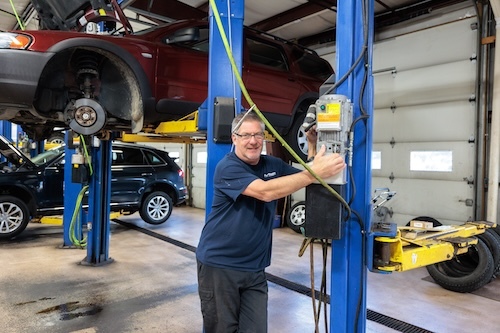Diagnosing Cold-Weather Electrical Issues in European Cars

When temperatures drop in Michigan, drivers of European cars may notice their cars behaving differently when it comes to electrical performance. Cold weather puts additional strain on batteries, alternators, wiring, and onboard electronics, and even well-maintained vehicles can show signs of trouble. If you’re seeking European Auto Repair in Ann Arbor, understanding the common causes and symptoms of cold-weather electrical issues can help ensure a quicker, more accurate diagnosis.
Why European Cars Are Sensitive to Cold-Weather Electrical Strain
Electrical systems power everything from heated seats and climate control to complex driver-assistance features. While this technology enhances comfort and safety, it also means the electrical load is higher than in many domestic vehicles—making them more vulnerable to cold-related performance.
Michigan winters make it especially challenging with low temperatures slowing down chemical reactions in batteries, thickening lubricants in moving electrical components, and increasing resistance in wiring, which can lead to starting problems and erratic behavior in electronic systems.
Common Cold-Weather Electrical Issues in European Vehicles
1. Weak or Dead Battery
Batteries lose about 35% of their strength at 32°F and over 60% at 0°F. If your battery is already a few years old, those cold mornings may be the tipping point. Symptoms include slow cranking, dim headlights, and dashboard warning lights.
How ArborMotion Can Help You: A battery load test will measure whether it’s holding sufficient charge under stress. Our specialists for European auto repair in Ann Arbor use diagnostic equipment calibrated for manufacturer-specific voltage requirements.
2. Alternator Underperformance
If your battery is healthy but still loses charge quickly, the alternator might not be replenishing it effectively. In cold weather, the alternator has to work harder to power systems like heated seats, defrosters, and high-output headlights.
How ArborMotion Can Help You: A multimeter test during idle and acceleration can reveal whether voltage output matches your car’s specifications.
3. Frozen or Corroded Cables
Moisture from snow and slush can creep into wiring connectors, leading to corrosion or even freezing inside protective boots. This can interrupt signal transmission between sensors and control modules.
How ArborMotion Can Help You: A visual inspection combined with continuity testing can pinpoint problem areas. European models often have tight engine bays, making professional inspection essential.
4. Sensor Malfunctions
Cold weather can affect wheel speed sensors, oxygen sensors, and even temperature sensors, triggering warning lights like ABS or Check Engine. Sometimes, the issue is not the sensor itself but a wiring or connection fault caused by temperature swings.
How ArborMotion Can Help You: Using OEM-compatible diagnostic scanners ensures accurate fault code reading, as some European models require brand-specific software.
5. Starter Motor Failure
Thicker engine oil in winter can put added strain on the starter motor, making it more likely to fail if it’s already worn. Symptoms include a clicking noise without engine turnover.
How ArborMotion Can Help You: Voltage drop tests can determine whether the starter is getting enough power, or if there’s excessive resistance in the circuit.
Prevention and Maintenance for Cold Weather
Addressing cold-weather electrical issues before they leave you stranded starts with preventative care:
- Battery Check: Test your battery before winter and replace it if it’s near the end of its lifespan.
- Alternator Inspection: Ensure charging output is within specifications.
- Cable & Connector Cleaning: Remove corrosion and apply dielectric grease.
- Software Updates: Many European cars rely on software-driven systems—keeping these updated can prevent electrical glitches.
- Garage Parking: Storing your vehicle indoors helps maintain warmer temperatures and reduces condensation.
Why Local Expertise Matters
European cars have unique electrical system layouts, proprietary diagnostic protocols, and specific repair procedures. That’s why seeking European Auto Repair in Ann Arbor is the best way to ensure accurate diagnosis and repair. Local specialists understand how Michigan winters affect high-performance European vehicles and have the tools and training to resolve cold-weather electrical problems efficiently.
Certified Technicians for Your European Vehicle – Schedule Service Today!
If you're due for maintenance or just want a comprehensive battery inspection, schedule a visit with our independent shop for European auto repair in Ann Arbor. Electrical issues in cold weather can be frustrating, but they’re not inevitable. By understanding the common problems, recognizing early warning signs, and working with a shop experienced in European auto repair, you can keep your vehicle running reliably through even the harshest Ann Arbor winters.











